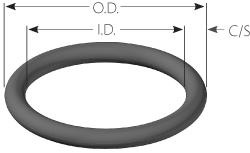
Neoprene O-Rings | Neoprene Gaskets | Neoprene Seals
Ace Seal stocks standard AS568 and metric size neoprene o-rings, as well as neoprene gaskets and neoprene seals. All are available in an extensive range of standard colors and durometers from 40-90. hardness. Custom durometers, colors, and industry certifications (FDA, NSF, 3A) are available upon request.
Request a quote on neoprene o-rings, gaskets, and seals for your application. Contact Ace Seal to place an order or to learn more.
Features of Ace Seal’s Neoprene Products
Resistant to:
ozone, sunlight/UV, oxygen aging, oxidation, petroleum derivatives, weather, combustion, water, chemicals
Do not use with: aromatic hydrocarbons, chlorinated hydrocarbons, acetones
Operational temperature range: -45° to 225°F (-43° to 107°C)
Hardness range (durometer): 40-90
Standard hardness: 70
Tensile range: 900 to 1,000 psi
Maximum elongation: 400%
Impermeable to gases and fluids
Standard color: black; custom colors available upon request
Available specifications: FDA, NSF, 3A
Neoprene Rubber Chemical Compatibility & Characteristics
If neoprene/chloroprene is not compatible with your application, view our chemical compatibility chart to find the best material for your needs.
Weather resistance: Excellent
Ozone resistance: Good to excellent
Abrasion resistance: Good
Flame resistance: Good
Impermeability: Good
Tear resistance: Good
Tensile strength: Good
Heat resistance: Good
Cold resistance: Fair to good
Acid resistance: Fair to good
Chemical resistance: Fair to good
Oil resistance: Fair to good
Dynamic resistance: Fair
Electrical properties: Fair
Set resistance: Fair
Water steam resistance: Fair
What is Neoprene Rubber? General Properties, Compatibility & More
Also known as polychloroprene or chloroprene rubber, neoprene is a type of synthetic rubber. It exhibits good chemical stability and excellent flexibility, which it maintains at extreme temperatures (from -45° to 225°F/-43° to 107°C).Neoprene o-rings, gaskets, and seals are weather, combustion, water, and chemical resistant, and impermeable to fluids and gases. It also resists degradation better than natural or standard synthetic rubber and is relatively inert. These properties make neoprene rubber well suited to a variety of demanding sealing applications.

